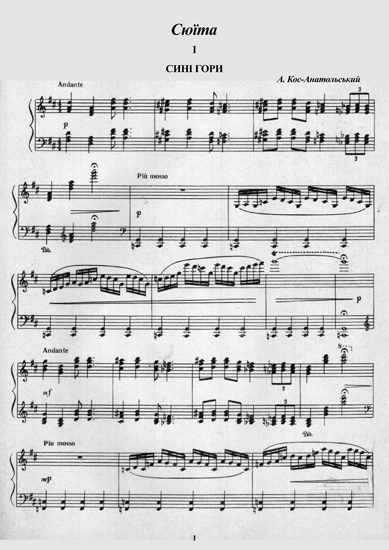Suite
Suite (сюїта). A composite musical form of related pieces or movements. Before the mid-18th century the genre usually consisted of a set of dances. Ukrainian lutenists and torban players of this period often composed and performed their own dance suites at the courts of Polish and Ukrainian nobles. In the late 19th century the word ‘suite’ was revived to describe a combination of instrumental movements forming a unified whole. One of the first Ukrainian composers to explore this genre was Mykola Lysenko, whose Ukrainian Suite (1869) for piano used Ukrainian folk songs within the framework of baroque dance forms. The genre continued to develop in the works of Vasyl Barvinsky and Nestor Nyzhankivsky. In the 20th century the programmatic orchestral suite became a favorite vehicle of Ukrainian symphonists. Notable examples are Andrii Shtoharenko’s In Memory of Lesia Ukrainka (1951), Heorhii Maiboroda’s King Lear (1959), and Stanyslav Liudkevych’s Carpathian Voices (1962), as well as works by Mykola Kolessa and Roman Simovych. Excerpts from ballets, musicals, and film scores in Ukraine were often arranged as suites in order to popularize the music. One of the best-known examples of this practice is Borys Liatoshynsky’s orchestral suite Taras Shevchenko (1952), derived from the same composer’s film score. Other notable works in this genre within the context of Ukrainian music were composed by such composers as Fedir Yakymenko, Pylyp Kozytsky (Kozak Holota, 1925), Dmytro Klebanov (Ukrainian Suite, 1949), Yulii Meitus, Anatol Kos-Anatolsky (Blue Mountains), Ihor Shamo (Ukrainian suite), and others.
[This article originally appeared in the Encyclopedia of Ukraine, vol. 5 (1993).]

